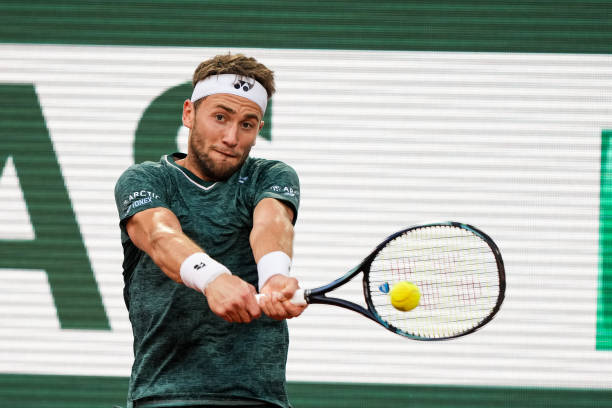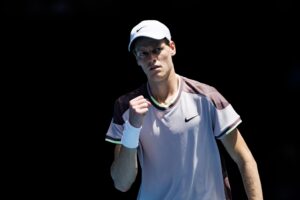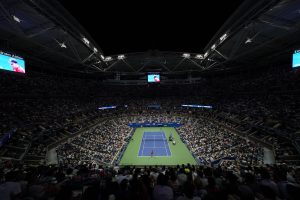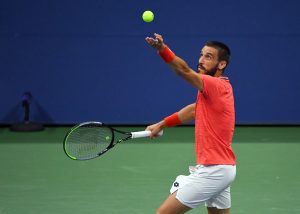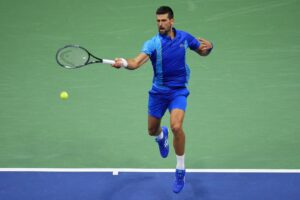Let’s pretend for a second that Ruud’s game isn’t the exact opposite of Brown’s. Sometimes that’s the idea, though, like Djokovic hiring Goran Ivanisevic to help him with his serve, despite the serve motion being almost completely different and on the opposite side. What if Casper Ruud, looking at the situation in this final and seeing that his skillset is the kind that Nadal eats for breakfast, reaches out to one of the men who frustrated Nadal the most? (Nevermind also that he opts not to call Robin Soderling, who had an almost identical game to Ruud, and who beat Nadal here at the French Open; Brown is more fun.) What advice would the peculiar Jamaican give him, and would he be able to pull it off?
What if Casper Ruud Called Dustin Brown for Advice?
Context for Calling Brown
To put this in some context, Dustin Brown faced a similar scenario to Ruud when he met Nadal in the second round of Wimbledon in 2015. The stage was not Nadal’s beloved Roland Garros, but neither was Brown a top 10 player like Ruud (not even a top 100 player, in fact). The mountain was equally as steep, and he and his team put their heads together the night before the match. “What can we do? Challenger tour skills don’t cut the mustard against all-time great players.” No, they don’t.
The result of their brainstorming was a wonderful demonstration of the power of strategy, and it is the reason why Ruud should give Brown a call. The Norwegian needs something other than forehands and backhands to lift his first Slam trophy, as Brown needed something more than his skinny, muscle-less frame could give him against the uber-athlete Nadal. But Brown can testify, along with others like Arthur Ashe and Brad Gilbert, that brain can beat brawns in tennis. And his strategy didn’t enable him to beat Nadal; it enabled Nadal to beat himself.
The Player Most Able to Beat Nadal is Nadal
Casper Ruud allows players to beat themselves by playing excellent defense and limiting his mistakes. But he does it by crushing the ball from both wings, and forcing players to make difficult shots against incoming power. This doesn’t work against Nadal. He will turn that power back around and use it to hit past you.
Dustin Brown and his team formulated the perfect plan, which was to give Nadal nothing to work with. Brown hit enough drop shots to make a power hitter puke, and softened up Nadal’s forehand with slices. Now, it might seem intuitive that if you hit a gentle shot to one of the best tennis players in the world, he will hit it exactly as hard and exactly as accurately as he wants. After all, you’re giving him pace that he was destroying in elementary school, and he’s 37 levels above that now.
But this is false. It is one of the mysteries of the universe that many top players (usually the power hitters) have trouble with slow balls, and it was confirmed in Nadal against Dustin Brown. Nadal kept hitting unforced errors off his forehand on routine shots, often pushing them long. There was little threat from Brown’s baseline rallies, and anyway, Nadal is not intimidated by anyone. But he was thrown off his rhythm, as a man who perpetually hits high-pace balls and plays high-pace tennis.
Pace Loves Pace
Furthermore, in order to hit through the court, especially on clay, it’s very helpful to have incoming pace. Some hitters are good at creating pace (Federer), but many if not most are better at absorbing and re-directing pace. They hit through the court by adding their power to the incoming power. But if the incoming speed is low, their power attack is less potent. They risk sending back a ball that is shorter or slower than they want.
In order to avoid this, they try to compensate by hitting harder; but this is an uncomfortable adjustment, because they are already hitting at their target power. The result is often an overhit, because they are not used to having to create so much pace on their own. And Nadal kept overhitting against Brown. There was nothing remarkable about Brown’s slices (it’s probably the least remarkable shot in tennis), and Ruud may be able to create this same kind of frustration with a liberal dose of slices.
Can Ruud Be Brown?
Can Ruud reduplicate Brown’s strategy? No. But let’s pretend he can. Ruud is a completely different player than Brown, and even has different swing mechanics. Brown’s elbow-dominated forehand is good for touch, and is why he thrives at the net. Ruud doesn’t have the same mechanics or the same touch, but he can get around this by attempting his drop shots from further back. If Ruud’s shoulder-swinging motion is more fit for power, then he can get a similar effect to Brown’s drop shots by just hitting them further from the net. This is what Carlos Alcaraz does, whose forehand is just like Ruud’s. Ruud had at least one great drop shot like this against Marin Cilic.
Don’t Hit Through Nadal, Hit Over Him
Once at the net, Ruud has Nadal on his back foot. Nadal plays well up there, but he doesn’t have the razor touch of someone like Djokovic, and he’s liable to hit his volleys deeper into the court. This, of course, opens a player up to the lob, and it’s what Ruud should be looking for. He doesn’t have Brown’s net skills, but he needs to make the most of Nadal’s net weakness, and needs an avenue of attack once he’s up there. The lob is it.
Contrary to what one might expect, Ruud’s best bet for a lob is on his backhand, not his forehand. Despite being a two-hander, Ruud’s backhand is actually weaker, and it has more wrist in it than his forehand. More wrist equals better touch, and it’s his best bet for a winning lob. If he drop shots to Nadal’s forehand, and covers his own forehand side, he will induce Nadal to play the net ball to his backhand wing. If it’s played far enough away from the net, Ruud will have the lob available.
Disrupt to Win
In fact, Ruud doesn’t even necessarily need to win more of the net points than Nadal. He probably wouldn’t. But as often as he makes Nadal play a game of touch, he frustrates him. And these frustrations can build up into mistakes in Nadal’s normal game. If he can split with Nadal at the net, and force mistakes in his baseline game because his rhythm is off, he might be able to win.
Casper Ruud will not call Dustin Brown. And we will likely not see any magic tricks off his racket. It takes time to develop strategy, and to be able to implement it without ruining one’s game, and Brown had the advantage of being well into his career at the time of the Wimbledon match (he was about 30). But maybe Ruud’s father—former tennis pro—had enough experience on tour to have worked on strategies like this, and maybe together they’ll see the need to get creative. Ruud has twice Dustin Brown’s baseline skill, and so all he may need is half his creativity to pull off an enormous upset.
Main Photo:


